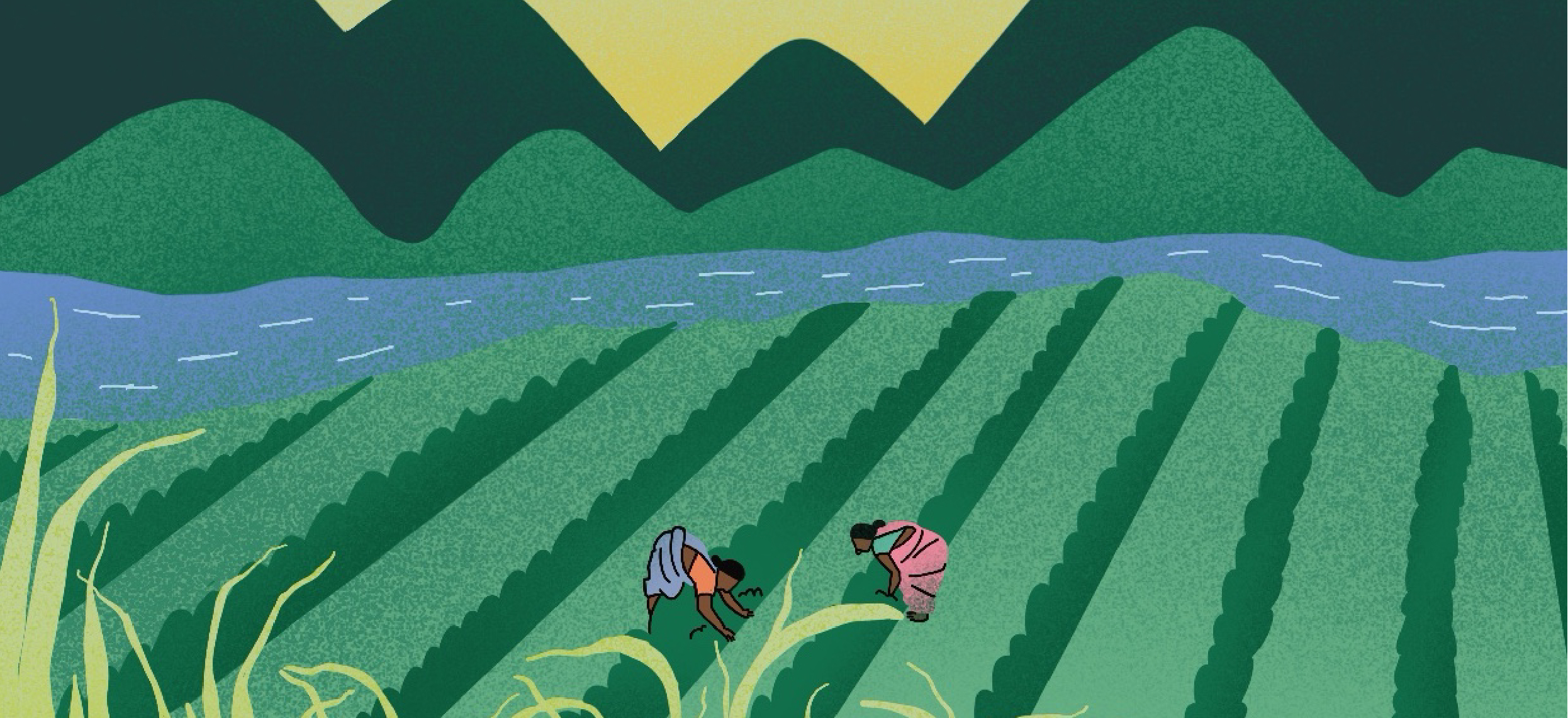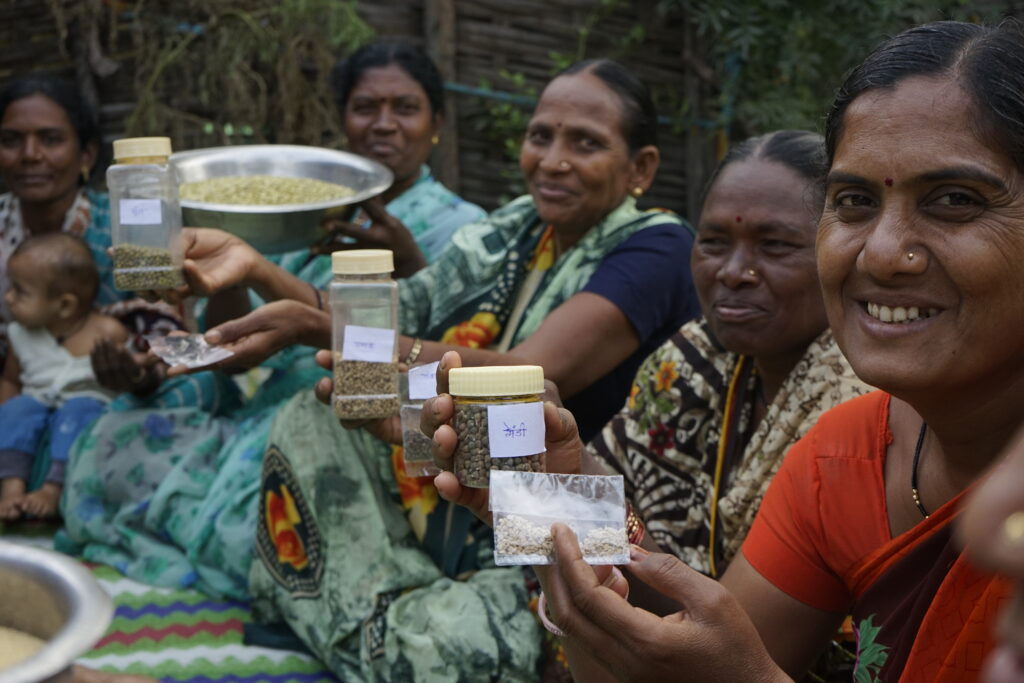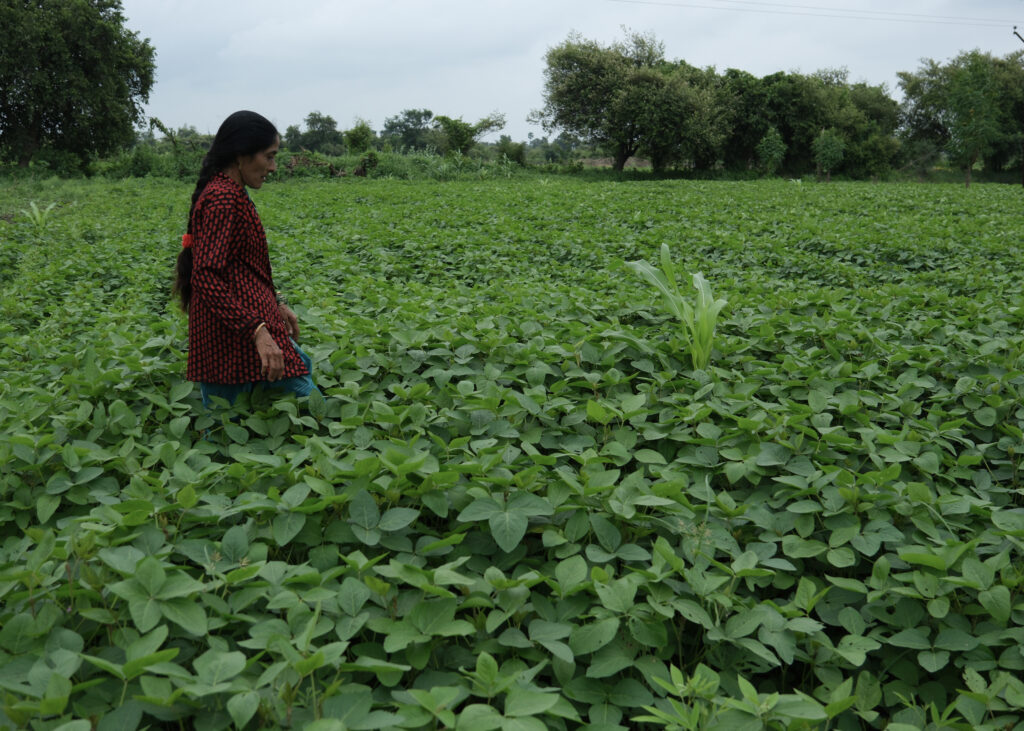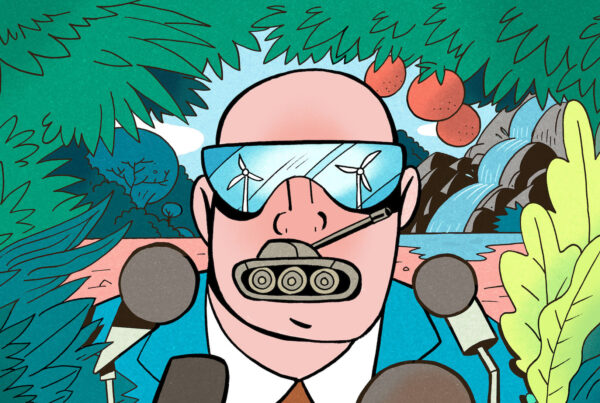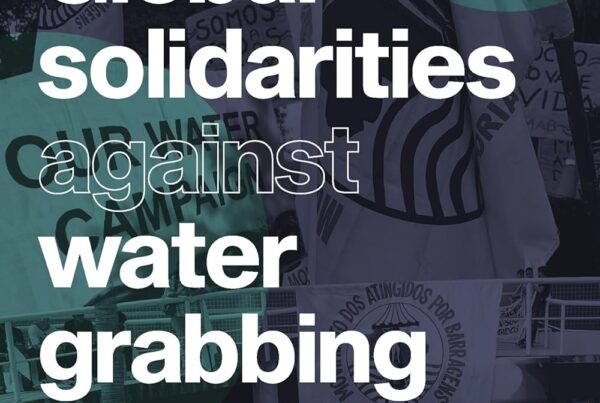by Enid Still, Irene Leonardelli and Arianna Tozzi
How can the interconnected spheres of feminist political ecology and agroecology inform each other? In this blog piece, we share some insights that emerged during a two-day webinar that brought together scholars and activists working on agrarian transformations through a feminist approach in different geographical contexts.
The 2-day webinar “Seeding Futures: Connecting Feminist Political Ecology and Agroecology” took place on 20-21 November 2024 (see full programme here) and was co-organized by members of the WEGO-ITN and by the NGO SOPPECOM. WEGO-ITN stands for “Well-being, Ecology, Gender and cOmmunity – Innovation Training Network”, and is a network funded by the European Union that brings together scholar-activists working on Feminist Political Ecology (FPE). SOPPECOM is a non-profit, non-governmental organisation working in the area of Natural Resource Management in India, and is committed to supporting the struggles of marginalised groups, particularly women farmers in rural Maharashtra.
The idea of the webinar emerged from years of collaborations between early career feminist researchers (including the authors of this blog piece), senior scholars and activists working on agroecology, food and water from feminist perspectives. Recognising that the practice and politics of agroecology and feminist political ecology share many concerns, we wanted to explore how these interconnected spheres can inform each other. We also wanted to learn how this relationship takes form across different spaces, including within activist movements, grassroot initiatives, governance, agricultural practices and academic contexts.
The webinar was incredibly inspiring with insights from young scholars and activists working in different regions of India, South America, Europe and Palestine. It allowed us to critically reflect on what it entails to work locally, but also how to weave translocal collaborations , to enact more equitable and sustainable agrarian livelihoods.
This piece outlines five main points of connections between FPE and agroecology that emerged from the webinar. To illustrate them, we draw on experiences and practices shared during the workshop by different speakers (naming them), acknowledging all the amazing work they do.
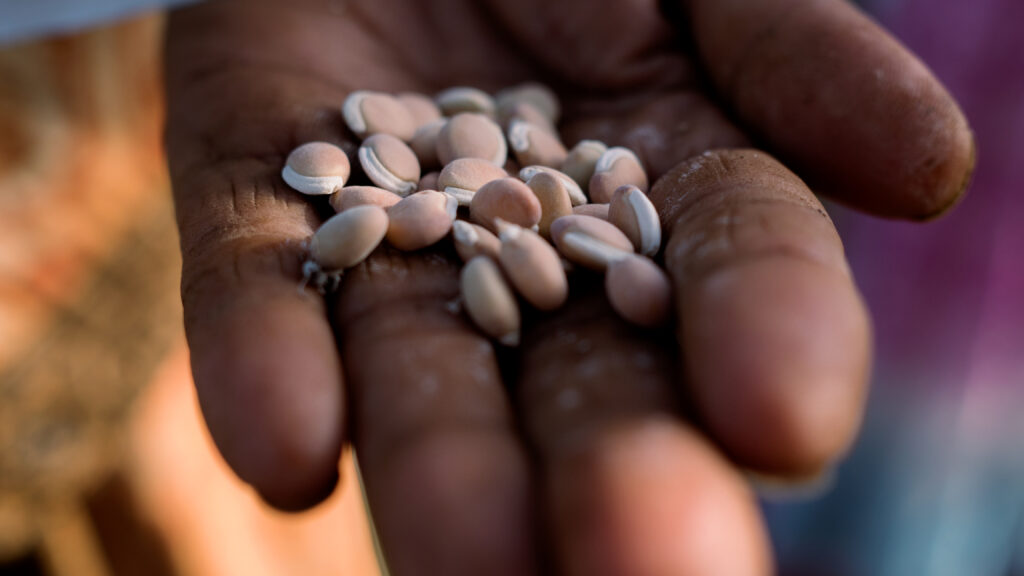
Saving seeds for the next harvest. Pune, Maharashtra. Credit: Adam Barr
Teasing out different interwoven connections between FPE and agroecology
- FPE and agroecology are interested in addressing interconnected systems of oppression, meaning they employ an intersectional approach to understand and counteract how access, use, knowledge of natural resources (such as land and water) differ across gender, class, caste, ethnicity and other intersecting hierarchical relations.
As illustrated by different speakers working in the Indian context, this approach is key to identify and address inequalities in rural areas where patriarchal and caste-based relations are still dominant. Seema Kulkarni, a senior fellow, researcher and activist working at the NGO Soppecom based in Pune (Maharashtra) and part of India’s nationwide informal alliance MAKAAM (Forum For Women Farmers’ Rights), stressed this point at the very beginning of her contribution. India’s ongoing agrarian crisis has to be looked at through a gendered lens: women farmers and particularly those belonging to scheduled castes do not own land titles and are marginalized institutionally and socially, often ending up working in exploitative conditions. For instance, women employed as cutters in the sugarcane fields of Maharashtra, work 12–13 hours long, with very few rests and in very poor sanitary conditions. Taking a feminist approach to these issues brings to light that alongside these exploitative work conditions women engage in several hours of unpaid work such as childcare, cooking, cleaning, and fetching water, often after a full day of work.
As highlighted by Archana Singh, who is based in Bhopal, India, and works as Integrator at the national NGO PRADAN, patriarchy is deeply rooted in and takes different forms across the various spheres of society. Therefore, she argued for an interconnected approach, where forms of feminist solidarity extend across work environments, the household, farmers’ fields and governance structures to influence change.
In Palestine, where Sana Karajeh works for the Union of Agricultural Works Committees (UAWC), women farmers face intersecting challenges – ongoing occupation, severe economic constraints and cultural expectations – creating a uniquely oppressive and dangerous environment that women have to navigate on a daily basis. Israel controls almost all resources including land, water and agricultural inputs. Their control of movement through checkpoints, road blocks, and ongoing land confiscation, make it dangerous and difficult for women to travel and access markets. All farmers and other workers suffer under severe economic constraints including entrenched poverty, limited job opportunities, an economy reliant on external aid, and an underfunded agricultural sector. Under these extreme conditions of everyday life for Palestinian farmers, women’s various contributions often go unrecognised because they are unpaid and therefore invisible in formal statistics. Similarly to what we heard from those working in India, women manage the bulk of farm labour, yet rarely own the land, crops or any income generated, which Sana identified as perpetuating a cycle of under-valuation. And of course, women in Gaza are confronted with severe environmental degradation including water pollution and scarcity and soil degradation from bombardments. Combined with unequal expectations of women to manage unsafe water on a daily basis and to be the primary caregiver under conditions of extreme insecurity, these intersecting pressures and challenges result in many women suffering psychological distress, including severe stress and anxiety. Yet despite these conditions and perhaps because of them, agroecology offers a pathway to resilience and empowerment. UWAC supports various agroecological practices including cooperative farming of Stevia and community gardens where women can share knowledge, resources and build community ties. These community-led projects draw on and promote traditional farming knowledge in the region, while also ensuring women have a say in how food is produced, thus improving food sovereignty and independence. - Another important point that emerged is how both FPE and Agroecology embrace diversity, in terms of biodiversity, plurality of knowledges and diversity of experience. All kinds of life that exist in one area, and in this case more specifically, a farmed area, are valued and taken to be part of a web of interdependency. This involves paying attention to different actors’ experiences, practices and knowledges of farming, particularly those that have been historically marginalized. Such knowledges and experiences are foregrounded in theoretical accounts as well as in practice, so as to rebuild their legitimacy, give them visibility and celebrate them. This has been particularly important in agriculture, where women are globally undervalued and unrecognised due to the intersecting structural inequalities described above, combined with context-specific processes of marginalisation, exploitation and violence.
Agroecological projects with women (especially single women and those marginalized by their caste) implemented by the MAKAAM network in different parts of India, illustrate how diversity is imbibed in their agroecological practices. By reintroducing mixed farming and an emphasis on traditional crops, the women farmers are on one hand able to enhance soil moisture thereby increasing the diversity and resilience of the micro-bacteria in the soil. On the other hand, they can balance food nutrition and financial needs of a household through diversifying crops throughout the seasons and with different germination periods. Through these projects MAKAAM and women farmers also advocate for changes to the procurement system, suggesting that it should be managed at community level for different crops and thereby reducing the risks of market fluctuation. Aside from the pragmatic, economic and health impacts of these projects, they also seek to influence cultural change through increasing the recognition of single women as bearers of knowledge, and increase their power within communities by supporting women to claim land titles.
Group of women farmers in Yavatmal, Maharashtra. Credit: Vidya Kulkarni
- In relation to the first two points, it is worth specifying that methodologically FPE and agroecology are both interested in working together with communities, engaging in processes of collective learning, strengthening solidarity and alliances.
Notably, agroecology offers the potential for increased solidarity, network building and political mobilisation when different groups (for instance, of researchers-activists and farmers with different identities and backgrounds) come together to care for the land and produce food. Not forgetting that making space for a diversity of voices has its challenges, several speakers noted that it is important not to simplify or romanticise movements inspired by feminist politics and agroecological practice.
As Martina Lo Cosico described, working directly with seasonal migrant farmers on an agroecology project on the island of Sicily, in Italy, opened a window onto their experiences and enabled the building of a support network during the Covid-19 lockdown, when water access became difficult for migrant communities.
In Mexico, Iliana Monterroso described how philanthropic organisation CLUA supported indigenous women to organise themselves and mobilise against a large energy and transport infrastructure project in the region, thereby. Using their knowledge of honeybee collection, and the adverse impacts of such large infrastructure, GMO as well as of industrial animal farming on their livelihood, indigenous women were able to mobilise and bring their case before the supreme court.Engaging with communities in processes of collective learning can also entail employing art-based methodologies, as suggested by Arianna Tozzi, postdoctoral fellow at the University of Manchester and conducting research on the colonial history of cotton cultivation in central India. Art based methods, like participatory sketching while interviewing women farmers can provide an important way to reverse hierarchies within research practices positioning women as the expert of regenerative farming practices. Additionally, the collection of oral history interviewing can help capture the undocumented life experiences of women who are leading the transition to agroecological methods and whose story often remains hidden underneath that of male members of the family. Creative methodologies can be combined with more established research practices like oral history interviewing and archival research, to create insightful and situated feminist analysis. - Differently from mainstream commercial and intensive agriculture, agroecology is interested in much more than profit, growth and productivity. By foregrounding the interdependence of well-being and health of people and the environment, agroecological feminist movements and projects give importance to other types of processes and relations, including care, trust, sharing, reciprocity and cooperation. Feminist Political Ecology is similarly concerned with addressing power imbalances within various modes of socio-ecological relations, including the economic and labour inequalities that emerge from agri-food systems. Inspired by feminist scholars such as Gibson-Graham, who, in their book “The End of Capitalism as we knew it: A Feminist Critique of Political Economy” (2016) argued for the importance of theorizing about the world without assuming the existence of a singular economic form (capitalism), FPE explores the role of commoning and community economies under different social, political and environmental conditions (See special issue on The Feminist Political Ecologies of the Commons and Commoning).
During the webinar, this connection emerged in the experiences of the speakers working with the MAKAAM network in India, who highlighted how labour relations in the context of agroecological projects are be based on trust, sharing and cooperation – to counteract the exploitative and violent dynamics that characterize mainstream commercial agricultural practices. At the same time, Kavitha Srinivasan, who also works for MAKAAM, noted that despite these cooperative modes of agriculture, farmers were switching back to using chemicals and monocropping, highlighting the need to take on-the-ground realities seriously and the dangers of romanticising agroecology.
This also emerged during the reflections proposed by Arianna Tozzi. Drawing on theories of social reproduction and critiques of capitalism inspired by feminist political ecology and political economy, Arianna stressed the importance of paying attention to all those activities and forms of labour that go into the reproduction of forms of life and how these labour translate to agroecological farming. These include for instance the knowledge and care needed to to plan, prepare and create an agroecological farm as compared to cultivating a single monocrops, and how this time consuming practices labor but also extend to the labour performed by more-than-human actors (e.g. the organisms of soil, water, animals), which is too often overlooked or taken for granted. Securing a just transition to agroecological methods, she suggested, therefore requires an entire redefinition of farming and of farming value beyond the horizon of a single crop productivity.
Marlène Elias, Gender Lead at the Alliance of Bioversity International and the International Center for Tropical Agriculture of CGIAR, invited participants to question the power imbalances that also emerge in policy and governance frameworks on agriculture. She underlined the importance of further recognizing the legitimacy of local communities, and especially of marginalized actors within communities, by amplifying their voices and influence in governance with a multi-scalar approach. In this regard, she stressed, it is fundamental to continuously reflect on who should bear responsibility for the implications of specific agricultural programmes and policy. FPE, Marlène suggested, offers the tools to think critically about these key issues in environmental policy and governance by asking questions such as: restoration or protection for whom and by whom? Who are legitimate stakeholders and why? What groups have been historically marginalised and why?
Marta G. Rivera-Ferre and Jessica Duncan, who are part of the team of researchers and activists working on the EU-funded “SWIFT: Supporting Women-led Innovation in Farming Territories”, also emphasized this point, by exposing how European policies mostly keep ignoring women farmers and their needs, supporting commercial (capitalist-driven) types of agriculture rather than agroecological projects. They emphasised the importance of agroecology and FPE in research and grassroot mobilisation because they both have ecology and social justice at their core, and are vital to reimagining systems of power.
Woman farmer in Akola, Maharashtra. Credit: Vidya Kulkarni
- Connected to the previous point is a final aspect that emerged during the webinar: how both FPE and agroecology highlight the importance of care work to sustain life on and off the farm. Feminist scholars throughout the world have argued how women have been historically responsible for all reproductive care work, including raising children, fetching water for the household, cooking, cleaning, taking care of elderly people within the household, among other tasks. This work, which is mostly unpaid and unrecognized, adds up to all the other work that women perform in the farm. For this reason, questions about how this care work becomes more visible and recognized, and how it can be shared more equally, are central to agroecology movements and projects.
Ain Contractor, a researcher-activist and PhD candidate at IHE Delft Institute for Water Education, has focused on this matter for the past few years, using a lens of care to understand relations between people and water. During the webinar, she talked about her current focus on careful irrigation in the context of agroecological projects, in India (Maharashtra) as well as in the Netherlands, to shed light on how less water demanding crops and less intensive farming systems can contribute to enacting more sustainable and equitable food systems. Her starting point is how agroecological movements across very diverse regions are considering unequal power relations as a root cause of environmental degradation, and thus call for rethinking agriculture and food systems by prioritising care and wellbeing of soils, people (all people across gender, class, caste, etc.) and biodiversity. Decolonizing agricultural knowledge and practice, she suggested, means re-imagining with foregrounding love for the land and solidarity across contexts.
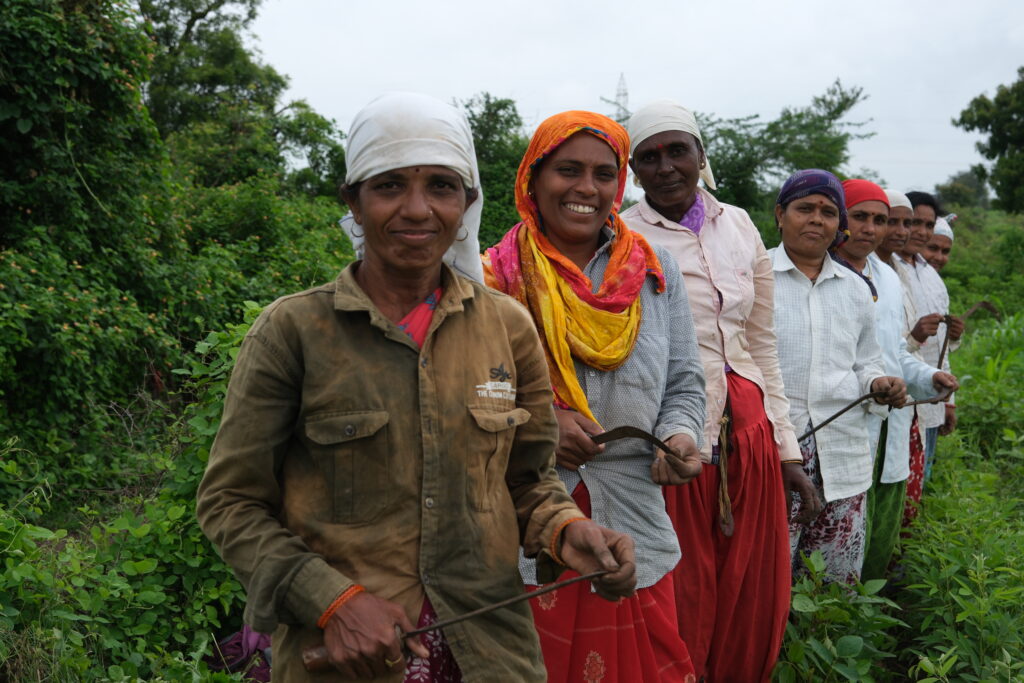
Group of women farmers in Akola, Maharashtra. Credit: Vidya Kulkarni.
Conclusions: “seeding futures” for whom and by whom?
We suggest that there is no agroecology without feminism. This point emerged vividly during the two-day webinar, and is reflected across the five points of connection discussed above. This however does not mean that agroecology is automatically feminist. In fact, a feminist agroecology, as a practice and as a politics, is clearly an ongoing, but never fixed or completed, transformative project. As we learnt, co-enacting alternative feminist futures requires re-imagining, re-learning and re-working structures and systems of power. Among other aspects, it requires strong, joyful, and- at times- unexpected alliances between movements, organizations, communities, people and more-than-humans. As this webinar showed, agroecological experiments across the world already provide fertile terrain for this to happen, where work rooted in local conditions and concerns also enables learning and sharing across different contexts.
With the title “seeding futures” we hoped to provoke a collective process to enhance transnational alliances and collaborations that can open up more space for feminist agroecological futures to flourish. To take advantage of the momentum gathered during the webinar, we have set up a mailing list that we envision as a grassroot-led platform bringing together scholars, activists and practitioners working on regenerative agriculture and processes of agrarian transformations through feminist and decolonial approaches. We hope it will be a space to share learnings, create connections and enlarge the conversation.
If you are interested in joining the conversation, you can sign up by sending an email to: [email protected]. You will then be asked to confirm your subscription before your request is sent to us (Enid, Arianna and Irene).
We want to encourage subscribers to make use of this forum by posting relevant content (events, articles, resources, calls for fundings etc) but also engage in discussions and debates that create synergies and build a sense of community. The content should not be limited to English, as we would like the platform to reflect the different languages of the people who are part of this network.
Cover image: Seeding futures. Credits: Himanshi Parmar.


